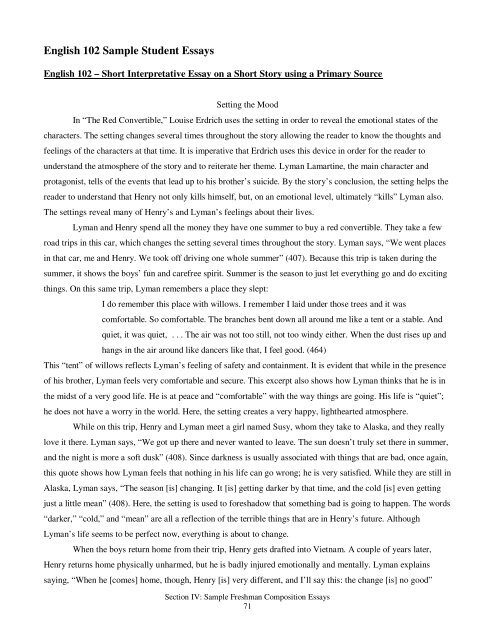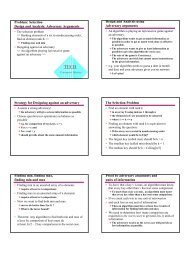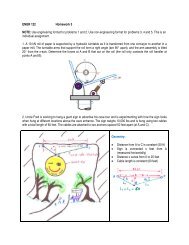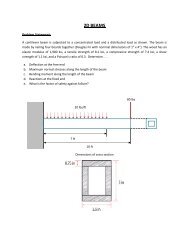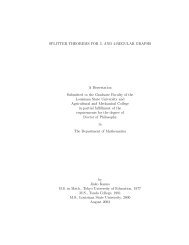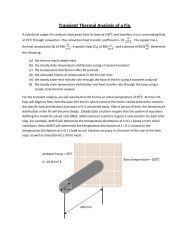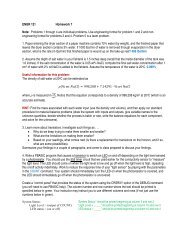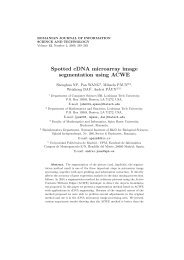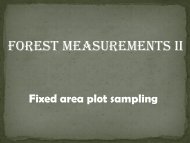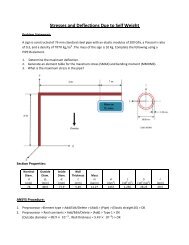English 102 Sample Student Essays
English 102 Sample Student Essays
English 102 Sample Student Essays
Create successful ePaper yourself
Turn your PDF publications into a flip-book with our unique Google optimized e-Paper software.
<strong>English</strong> <strong>102</strong> <strong>Sample</strong> <strong>Student</strong> <strong>Essays</strong><br />
<strong>English</strong> <strong>102</strong> – Short Interpretative Essay on a Short Story using a Primary Source<br />
Setting the Mood<br />
In “The Red Convertible,” Louise Erdrich uses the setting in order to reveal the emotional states of the<br />
characters. The setting changes several times throughout the story allowing the reader to know the thoughts and<br />
feelings of the characters at that time. It is imperative that Erdrich uses this device in order for the reader to<br />
understand the atmosphere of the story and to reiterate her theme. Lyman Lamartine, the main character and<br />
protagonist, tells of the events that lead up to his brother’s suicide. By the story’s conclusion, the setting helps the<br />
reader to understand that Henry not only kills himself, but, on an emotional level, ultimately “kills” Lyman also.<br />
The settings reveal many of Henry’s and Lyman’s feelings about their lives.<br />
Lyman and Henry spend all the money they have one summer to buy a red convertible. They take a few<br />
road trips in this car, which changes the setting several times throughout the story. Lyman says, “We went places<br />
in that car, me and Henry. We took off driving one whole summer” (407). Because this trip is taken during the<br />
summer, it shows the boys’ fun and carefree spirit. Summer is the season to just let everything go and do exciting<br />
things. On this same trip, Lyman remembers a place they slept:<br />
I do remember this place with willows. I remember I laid under those trees and it was<br />
comfortable. So comfortable. The branches bent down all around me like a tent or a stable. And<br />
quiet, it was quiet, . . . The air was not too still, not too windy either. When the dust rises up and<br />
hangs in the air around like dancers like that, I feel good. (464)<br />
This “tent” of willows reflects Lyman’s feeling of safety and containment. It is evident that while in the presence<br />
of his brother, Lyman feels very comfortable and secure. This excerpt also shows how Lyman thinks that he is in<br />
the midst of a very good life. He is at peace and “comfortable” with the way things are going. His life is “quiet”;<br />
he does not have a worry in the world. Here, the setting creates a very happy, lighthearted atmosphere.<br />
While on this trip, Henry and Lyman meet a girl named Susy, whom they take to Alaska, and they really<br />
love it there. Lyman says, “We got up there and never wanted to leave. The sun doesn’t truly set there in summer,<br />
and the night is more a soft dusk” (408). Since darkness is usually associated with things that are bad, once again,<br />
this quote shows how Lyman feels that nothing in his life can go wrong; he is very satisfied. While they are still in<br />
Alaska, Lyman says, “The season [is] changing. It [is] getting darker by that time, and the cold [is] even getting<br />
just a little mean” (408). Here, the setting is used to foreshadow that something bad is going to happen. The words<br />
“darker,” “cold,” and “mean” are all a reflection of the terrible things that are in Henry’s future. Although<br />
Lyman’s life seems to be perfect now, everything is about to change.<br />
When the boys return home from their trip, Henry gets drafted into Vietnam. A couple of years later,<br />
Henry returns home physically unharmed, but he is badly injured emotionally and mentally. Lyman explains<br />
saying, “When he [comes] home, though, Henry [is] very different, and I’ll say this: the change [is] no good”<br />
Section IV: <strong>Sample</strong> Freshman Composition <strong>Essays</strong><br />
71
(465). During this time, the setting of the story is at the home of Henry and Lyman. The reader can see how badly<br />
the war has affected Henry, considering the fact that he does not even feel safe in his own home. It is here where<br />
the atmosphere first changes from blissful to miserable. Lyman gets a glimpse of his future, realizing that it is not<br />
going to be perfect.<br />
When Henry seems to be feeling a lot better, emotionally, he and Lyman embark on their second road<br />
trip. Here, the setting contradicts the happy, pleasant setting of the first trip. When they get to the river, it is “high<br />
and full of trash ... The sun [is] still out, but it [is] colder by the river” (467). The cold weather and the trash<br />
represent Henry’s desperate mindset. This is the place where Henry “throws away” his life. The story also says,<br />
“The water [has not] gone over the banks yet, but it [will], you [can] tell. It [is] at its limit, hard swollen, glossy<br />
like an old gray scar” (467). Henry, like the river, is about to go over the edge emotionally. He is obviously very<br />
unhappy in his current life, and if he does not do something about it, he is going to go crazy. Unfortunately, in this<br />
case, Henry believes his only way out is to take his own life. After Henry commits suicide, Lyman makes the<br />
statement, “the sun is down” (469). This reflects Henry’s death; the sun has set on his life. This also shows<br />
Lyman’s devastated state of mind and creates a very lonely and melancholy mood. Lyman has lost his only<br />
brother with whom he had such a loving bond. He knows that his life will never be the same. This situation is<br />
proof that suicide is a selfish act because of the profound negative effects it has on other people.<br />
The various settings in “The Red Convertible” reflect the mental states of the characters. By analyzing the<br />
setting, the reader can see the drastic emotional changes that Henry and Lyman undergo. With Henry’s suicide<br />
and Lyman’s obvious heartache, Erdrich illustrates her theme that suicide is a selfish act that results in longlasting<br />
effects on the victim’s loved ones.<br />
Work Cited<br />
Erdrich, Louise. “The Red Convertible.” Literature and the Writing Process. Ed. Elizabeth McMahan, Susan X<br />
Day, and Robert Funk. 6 th ed. Upper Saddle River, NJ: Prentice-Hall, 2002. 407-413. Print.<br />
Section IV: <strong>Sample</strong> Freshman Composition <strong>Essays</strong><br />
72


